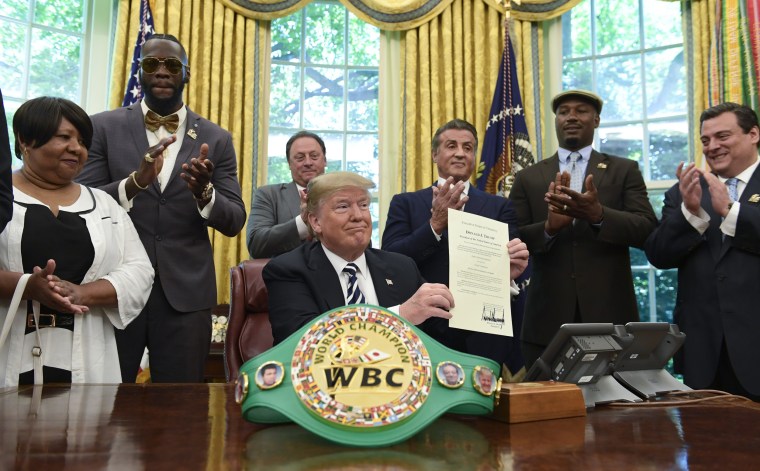“Jack Johnson is a reminder that Black athletes are free to protest racial injustices in America as long as they've already died.”
I tweeted this the day after President Donald Trump pardoned Johnson posthumously for the Jim Crow era crime of transporting a white woman across state lines. Since then, Trump has granted clemency to Alice Johnson — an African American woman serving a life sentence for drug charges — and has floated the idea of pardoning “thousands of others,” including Muhammad Ali.
Of these, Trump’s singling out of Ali is especially telling. For one thing, Ali doesn’t need a pardon, since a unanimous 1971 Supreme Court overturned his conviction. But this fact aside, it’s hard to reconcile Trump’s apparent desire to forgive Ali’s political activism with his support for a new National Football League policy to fine teams whose players peacefully protest racism and police brutality during the national anthem.
Americans must avoid the trap of believing that rectifying certain high-profile injustices against black Americans amounts to rectifying a criminal justice system that created and continues to perpetuate such injustices.
The fact is, these high-profile pardons are a calculated play for black and brown votes. In the 2016 election the president received only 29 percent of the Latino vote, 29 percent of the Asian vote, and an abysmal 8 percent of the black vote, according to exit polls. Presidential pardons and Kanye “slavery is a choice” West partnerships are tactical attempts to increase those numbers for midterm elections and beyond. Accordingly, Americans must avoid the trap of believing that rectifying certain high-profile injustices against black Americans amounts to rectifying a criminal justice system that created and continues to perpetuate such injustices.
A brief bit of historical context is important here. Today, America comprises around 5 percent of the world’s population but leads the world with almost 25 percent of the world’s prison population. It wasn’t always like this. In 1973, the National Advisory Commission on Criminal Justice Standards and Goals recommended: “No new institutions for adults should be built and existing institutions for juveniles should be closed…the prison, the reformatory and the jail have achieved only a shocking record of failure. There is overwhelming evidence that these institutions create crime rather than prevent it.” In 1972, America’s prison population was around 350,000 people — or around 160 incarcerated Americans per 100,000 citizens. Today that number is around 2.3 million people — or more than 700 incarcerated Americans per 100,000 civilians.
This spike is the result of an insidious plan to counter the civil rights movement. Just as Jim Crow laws replaced the collapsed system of slavery, mass incarceration has replaced the collapsed system of Jim Crow.
As scholar Michelle Alexander and author of the landmark book “The New Jim Crow” writes, “H.R. Haldeman, one of President Nixon’s key advisers, recalls that Nixon himself deliberately pursued a Southern, racial strategy: [Nixon] emphasized that you have to face the fact that the whole problem is really the blacks. The key is to devise a system that recognizes this while not appearing to.” Indeed, Nixon’s special counsel John Ehrlichman described Nixon’s 1968 strategy as, “We’ll go after the racists.”
The 1980s White House advanced this strategy with its so-called war on drugs — concocted at a time when a tiny fraction of Americans viewed drugs as America’s most important issue. The federal government offered subsidies to police departments which in turn encouraged higher arrest rates in black neighborhoods and communities. The White House also pushed legislation that resulted in black crack cocaine users ending up with prison terms many times longer than (largely white) crack powder users.
Which brings us back to the current White House. In 2016, then-candidate Trump branded his pitch to the American people as the “law and order candidate.” Combined with his “Make America Great Again” logo, the racial dog whistle was deafening. Here we saw exactly the same kinds of rhetoric that was common 50 and 60 years ago.
Until he dismantles the pillars of institutional white supremacy in our criminal justice system, the pardons themselves — while often warranted — are at best a play for black and brown votes.
As Alexander writes, “The rhetoric of ‘law and order’ was first mobilized in the late 1950s as Southern governors and law enforcement officials attempted to generate and mobile white opposition to the Civil Rights Movement. Conservatives systematically and strategically linked opposition to the civil rights legislation to calls for law and order, arguing that Martin Luther King Jr.’s philosophy of civil disobedience was a leading cause of crime.”
Today, “law and order” is being used to justify ripping babies from the arms of mothers seeking asylum. It’s the justification for horrific executions by police of unarmed black men, women, and children like Stephon Clark, Aiyana Jones, Charleena Lyles and Tamir Rice. It’s why black youth are less likely to abuse drugs and alcohol than white youth, but are charged and convicted at a rate of roughly three to six times higher than white youth.
Trump can pardon thousands of black citizens, each more high profile than the next. But until he dismantles the pillars of institutional white supremacy in our criminal justice system, the pardons themselves — while often warranted — are at best a play for black and brown votes. Such pardons do little to prevent continued exponential growth of mass incarceration. Rather, they give the false impression of reform while condemning millions of black and brown lives to perpetual unjust incarceration. Nobody's best hope for justice should be a posthumous pardon.
Qasim Rashid is the national spokesperson for the Ahmadiyya Muslim Community USA and a Truman National Security Fellow. Follow him on Twitter @MuslimIQ

